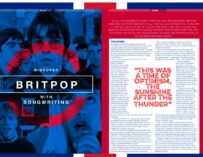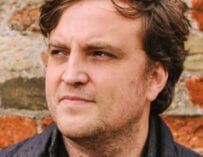
Shelly Poole: “Even though the Alisha’s thing sounds like good fun, and it was brilliant, it was like pulling teeth.”
One half of 90s sister act Alisha’s Attic discusses life as a behind-the-scenes songwriter and on-stage with Red Sky July
Daughter of Brian Poole of the classic 1960s group The Tremeloes, Shelly Poole is a successful British singer and songwriter, both as an in-demand collaborator and an artist in her own right. With her sister Karen Poole, she formed the duo Alisha’s Attic in 1989 and – working with top producers including Bill Bottrell and Eurythmics’ Dave Stewart – scored a string of hit singles, made gold and platinum albums and secured a nomination for an Ivor Novello award.
The duo split up in 2001, but as with her sister, Shelly wasn’t ready to stop making music and went on to become an in-demand topline writing, collaborating with – and writing songs for – the likes of Janet Jackson, Massive Attack, Mark Ronson, Gary Barlow, Paloma Faith, Michael Gray, Rachel Stevens, Will Young, Atomic Kitten, Sophie Ellis Bextor, Westlife, Boyzone, Ronan Keating, Mel C, Liberty X and Bo Bruce. She also found time to record her 2005 solo album Hard Time For The Dreamer which reached the Top 10 of the French and UK iTunes chart.
In 2008, Shelly formed the alternative country band Red Sky July with her husband Ally McErlaine – lead guitarist and founder member of Scottish band Texas – and American singer Charity Hair from The Alice Band. Red Sky July have released two Top 20 iTunes albums with both entering the Official UK Country charts in the Top 5, and won the Nordoff Robbins inspiration award in 2013.
Shelly also continues to write with, and mentor, new and emerging artists and is a member of the production team Alchemy who produce music for television and film. Somehow, she managed to find a gap in her busy schedule – in fact, just before Ward Thomas was due in for a writing session – to speak with us about her approach to collaborating and her insatiable urge to keep creating and performing…
What did you do when Alisha’s Attic ended?
“I’m a producer as well, so I remember thinking it would be nice to be faceless, for a while. I tried that and my publishers kept me on and I was getting specs for things. I can’t remember what artists they were for back then, but they would ask me for songs like Alisha’s Attic and I thought, ‘Ooh, I can do this!’ Karen and I are best friends, but it was very clear that we were going in completely opposite directions, musically. Even though the Alisha’s thing sounds like good fun, and it was brilliant, it was like pulling teeth. So it was a really good idea for our friendship that we just went our own way, and left it as a lovely little time in history!”

Shelly: “The concept of the song is so massively important”
Is that because you were sisters and there was a natural friction between you?
“No, it was just musical differences. We’re both very stubborn and hot-headed and we both care a lot, which made for a brilliant three albums for Alisha. At the time we were just so proud of them, but it took a lot of doing because we both had to be absolutely happy with it. And when you’re co-writing, it can’t be about one person. You’re collaborating and that’s really difficult when you’re trying to think of yourself as an artist, too. It’s a very strange thing!
“So I think going off on your own for a while, when you’ve done a collaboration like that, is a really good thing – to work out what you do and why you want to do it. So I remember saying to my publisher, ‘I’m going to get loads of demos and bring them in.’ I took them in and he said, ‘Who produced these?’ I said I did and he was like, ‘Brilliant! Well then that’s what you do now.’ So I did that, got loads of specs, worked with loads of artists, tried really hard to be behind the scenes… but then started to realise it’s not quite as fulfilling as I’d hoped it would be.”
What sort of artists were you writing for?
“Back then I was doing all the pop people like Rachel Stevens, Will Young and Mark Ronson. I think my first song was for Rachel [Je M’Appelle]”
Were you producing ideas on your own and pitching them via your publisher, or had you started collaborating with any of these artists?
“At the time, I was just on my own. Karen did the opposite and schmoozed and made loads of friends, and I went totally into myself but I really enjoyed it, to be honest. I had my home studio in a backroom in Hampstead, London. When it came to writing with an artist, I remember my first one was actually someone I found myself that I really liked and just wrote lots of stuff with her. She was Norwegian and her name was Sara Sjoldnes. I used to enjoy doing that – it’s much more fun doing your own thing.”
Didn’t you ever find it difficult writing on your own, with infinite possibilities and without anyone telling you what to do?
“Well no, because most of the time I was writing to a spec. Actually, I think that’s quite confining and it’s a massive discipline. I remember getting asked to write something really ‘dark… like the Sugababes’ and I was thinking, that’s not dark! You always get told they want ‘big hits’. Oh really? They don’t quite know what it is they want, but they want big hits. Brilliant!”
So where would you look for inspiration when the spec was that vague?
“With the pop stuff, sometimes there are brilliant reference points like Prince. I pretty much learnt everything from him, and some of his songs were just pure sex! I think those experiences go into the pop songs as well.”

Shelly: “I like writing songs and it’s a great outlet, but singing is such a pleasure and I can’t not do it!”
Did you keep throwing them loads of rough ideas or concentrate on finishing a fully produced song?
“Well, I used to always write on acoustic guitar but then, because of all the new gear I’d bought, I started to do a few synth tracks and then write over that. I’ve come full circle and only write on acoustic guitar, because the stuff I’m doing now is more classic songwriting, I suppose. But back then, a lot of it was about the production and the feel and a couple of hooks – it definitely wasn’t the Nashville school of songwriting. Whereas now I’m a bit more controlled about it. But then I think most of the time I just used to sit and get a nice little chord progression, then write a melody, and go from there.”
How did you approach writing lyrics?
“I used to have books and books of lyrics, but they’re a weird one because it needs to be something ‘of me’ to know what I’m talking about. It usually comes out of an experience you’ve had, or someone’s told you about, or one of your friends is going through. The concept of the song is so massively important. If you’ve got a really strong concept, then it’s easy to write. Whereas if you’re not sure what the true story is, it’s bloody hard.”
Who are you enjoying writing with at the moment?
“Beth Neilson Chapman is one my ‘safe’ people – she knows exactly how I work – we always write a good song together. I’ve got her coming in to write with me for Ward Thomas. We just gel straight away, we know exactly what the other is thinking, it’s amazing. I feel like I can do that [with her], but sometimes I go into an environment where it’s new for me and I’m not sure who I am.
Is that when you’re writing as part of a team?
“I like co-writing when there’s two of you. Sometimes I like it when there’s three of you, if there’s an artist, a track person and I’m doing topline. That would be fun because no one steps on each other’s toes, but if you’re all trying to do the same thing, one of you has to sit back. So you walk into a room and kind of assess everyone – if you haven’t written with them before – and go, ‘Who am I in this scenario? Am I going to start the idea? Should I be that bold in front of these people?’ It’s very odd. Usually I’d be the one who starts the idea, but sometimes I feel I shouldn’t and I should be the ‘glue’ rather than the ‘starter’!”
I suppose that chemistry can take time to develop and to get the dynamics right between everyone?
“Yeah and it’s so personal. You need at least two hours to talk to the people you’re writing with first, to find out what they like and what they do.”
You said that working behind the scenes wasn’t quite as fulfilling as you’d hoped it would be. What were you missing?
“I just really missed the singing. That’s the one thing in my life that I absolutely love. I like writing songs and it’s a great outlet, but singing is such a pleasure and I can’t not do it! And I don’t get enough pleasure just singing by myself at home; it’s something I really have to do. I don’t care what capacity or at what level, I just bloody love it! It’s very odd.”

Red Sky July (left to right): Ally McErlaine, Charity Hair and Shelly Poole – “my heart and soul”
So you started Red Sky July with your husband Ally. How did that come about?
“He used to write these lovely little pieces of guitar music that were just too beautiful and I used to sing along over the top. I’d worked with Charity – she was the singer in [Blur drummer] Dave Rowntree’s band [The Ailerons] and I wrote with him quite a lot. She was on the circuit doing stuff and I said to Ally: ‘She’s got a good voice, shall we see if she wants to sing a harmony on our stuff?’ So Charity came in and it sounded flippin’ awesome!”
If you’re working in your studio at home and then writing music with your husband at home, when do you stop?
“I class the writing for other people as my ‘day job’ – that’s more of a discipline. Red Sky is completely different: that’s like my heart and soul. I feel like… if I didn’t do that I would die! I can sit up till five o’clock in the morning and not know the time because I care about it so much. Whereas, if it’s anything else – not that I don’t care – I’d have a cut-off point when we eat or go for dinner, or something.
“I’ve got my own solo stuff as well. I’ve got a thing called Alchemy with Ben Adams, who’s an amazing writer and producer, and we do a lot of TV and film music. I love putting music to visuals, it’s so exciting. I’m doing music for a sketch show as well. There’s quite a lot to do! Music is so all-encompassing and, with Ally and I, we don’t have children – that is our life!”
Do you like to get out and write in different places?
“I prefer to be in my studio, to be honest, and I think I get better results there. I’m in Muswell Hill, literally two minutes walk from my sister. I’ve got a really good studio so it makes sense for people to come to me. But when I write with Ben for Alchemy we do a lot of pop stuff and we do that at his, in Clapham. I like that place because I spend so much time there.”
Do you do any music with Karen at all now?
“No, we don’t do anything. We barely even talk about it, but it’s really nice because we have a little bit of normal life now. So it’s actually really pleasurable when Karen and I see each other, we don’t talk about music. Of course, even my dad’s a musician so everything is about bloody music! That’s all our lives, that’s it – our hobby and job and pleasure… and pain!”
Interview: Aaron Slater
Red Sky July release their third album The Truth And The Lie on 25 March 2016 and have a headline tour in May. To pre-order the album or find out more about the band visit redskyjuly.com and to keep up to date with Shelly Poole, follow her on Twitter – twitter.com/shellypoole




































Related Articles